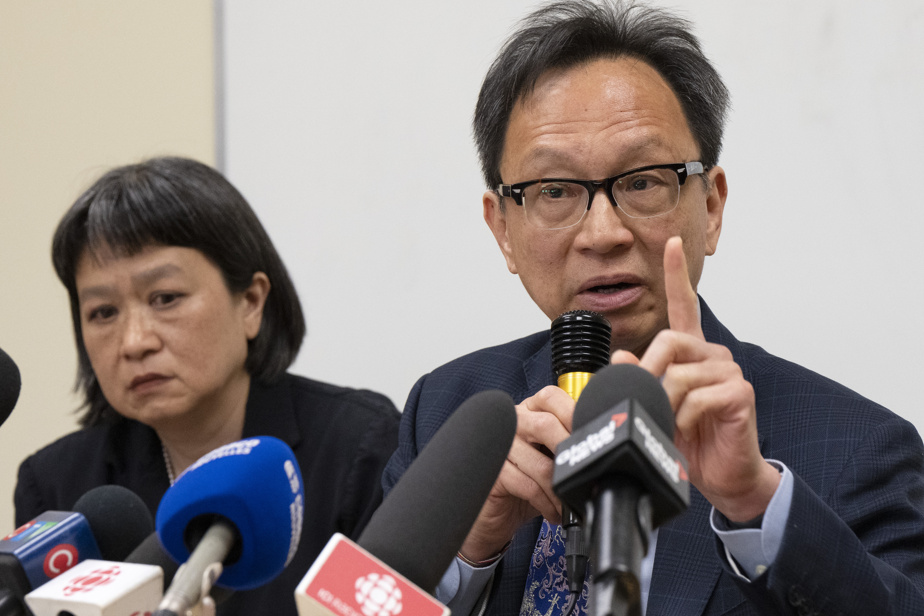(Montreal) A Canadian senator denounces the stigmatization of two Montreal community organizations accused by the Royal Canadian Mounted Police (RCMP) of hosting secret police stations of the Chinese government.
Independent Senator Yuen Pau Woo told reporters Friday that the RCMP must present evidence against these two groups or leave them alone.
“Provide information, clarity, and meanwhile, don’t create more problems for the community,” Woo said.
Mr. Woo, an independent senator representing British Columbia, called for fairness, due process and the rule of law. He argued that the two community groups, which he says provide aid to the Chinese community in Quebec, were found guilty of allegations that have not been explained.
“It has caused community members to be hesitant to come for services and they are suffering, not you…not the RCMP, but people who would come here for services who are hesitant to come because they are worried of what might happen if they come here,” the senator denounced.
Mr. Woo made the comments during a press conference with members of Montreal’s Chinese community at the office of one of the groups targeted by the police, Chinese Family Service of Greater Montreal.
Members called for an end to the investigation, describing it as a sword of Damocles hanging over the community. Some were considering seeking damages in court.
In mid-March, the RCMP said that the organization, along with the Center Sino-Québec de la Rive-Sud, located on the South Shore of Montreal, harbored Chinese government agents who allegedly harassed members of the Chinese community in the city.
Public Safety Minister Marco Mendicino told a parliamentary committee last week that the RCMP had closed so-called police stations in Montreal, Toronto and Vancouver.
The RCMP said Friday that they continue to actively investigate reports of criminal activity in connection with the alleged “police stations.”
“It is important to note that some of the activities the RCMP is investigating took place at locations where other legitimate services to the Chinese-Canadian community were or are being offered,” Corporal Kim Chamberland said in a statement sent by e-mail.
“The RCMP will not comment on specific locations as investigations are ongoing. However, the RCMP can confirm that our national response disrupted illegal activity. »
Spanish human rights organization Safeguard Defenders, which has identified more than 100 of the alleged police stations in more than 50 countries, said the stations are used to “persuade” people who Chinese authorities believe are fugitives returning to China to face charges.
The Chinese government has denied these allegations.
Senator Woo railed against the Spanish group on Friday, asking why authorities believed the word of a foreign organization, “making allegations, serious allegations that impact Canadians.”
Mr. Woo claims that neither he nor the groups under investigation by the RCMP know the details of what they are charged with or what even constitutes an underground police station.
“All of us here are opposed to foreign interference, we are all against harassment, the intimidation of Canadians and we must use all the tools at our disposal, the legal tools to stop foreign interference, harassment and bullying, Mr. Woo added. But we cannot do this at the expense of the rights and privileges of our citizens. »
An immigration lawyer, Walter Tom, has called it irresponsible to link community organizations with illegal practices without documenting them.
“By associating, in such an irresponsible way, these two organizations with secret police stations, and in particular by displaying the names of these two organizations whenever there are headlines about the underground police, it creates an atmosphere out of fear,” argued Mr. Tom.
May Chiu, a family lawyer and head of the Chinatown Roundtable, said all board members of the two organizations had worked with the RCMP, but had not heard from the police since mid -March. Me Chiu, a former general manager of the Montreal center, said she was unaware of any illegal activity during her tenure.
She pointed out that the staff were mainly made up of women who are social workers, adding that many feared and were stressed about losing their livelihoods.
“It breaks my heart that they themselves are living very, very precariously right now,” Mr. Chiu said.





















